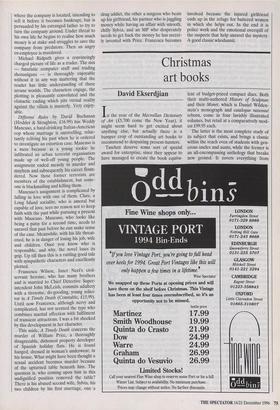A choice of recent thrillers
Harriet Waugh
Elizabeth Ironside's The Accomplice (Hodder & Stoughton, £16.99) is her third novel. Her first, A Very Private Entoprise, showed real promise; her second, Death in the Garden, was particularly enjoyable, and with her third she joins those few mystery writers you unreservedly look forward to reading.
The Accomplice is densely written and quite complicated. Jean Luftus is an old Russian woman who married an English- man after the second world war. Now suffering from arthritis, she is retiring to a bungalow and handing over her pretty house and garden to her stepson Marcus and his wife Naomi, an emotionally obtuse psychologist. While alterations are being made to the garden, the skeleton of a child is dug up. Nobody knows how long it has lain there, but Detective Superintendent Stevens seems to view Jean Loftus with such peculiar suspicion that her solicitor, Zita Daunsey, who is also of Russian extraction, feels it necessary to investigate the death. Then Jean's mysterious past comes back to haunt her when she receives a letter from a young Russian woman with the same distinguished surname as Jean's vanished family. Xenia, angry, sly and sexy, arrives in England with the overriding objective of staying, and Jean becomes her victim.
Elizabeth Ironside's characters have complicated lives which prevent them see- ing the unfolding tragedy. Even Zita, through whose eyes we partially view the action, realises too late what is happening. These complicated lives play an integral part in this thoroughly satisfying psycholog- ical thriller.
Far less satisfying is Patricia Comwell's Cause of Death (Little Brown, £16.99) star- ring her pathologist, Dr Kay Scarpetta. It begins well enough. Scarpetta is covering for a colleague in a windswept coastal Vir- ginian subdivision near the US naval amphibious base at Sandbridge. Scarpetta is called out to the base's inactive ship- yard, which houses the rusting hulks of out‘ of-date boats, to examine a body found deep underwater. The dead man turns out to be an investigative journalist known to her. Captain Green of the Navy Investiga- tive Service and Inspector Roche of the local police declare the death an accident. Their truculent attitude signals they are baddies.
Scarpetta, in her usual way, is aggressive- ly suspicious and in no time at all she and the FBI are investigating a villainous sect called the New Zionists who plan to take over America using an amazing nuclear arsenal. The only person who stands in their way is, of course, Scarpetta and her genius computer-whizkid niece, Lucy, who works for the FBI. Scarpetta's gritty integrity, clever scalpel, and the emotional adrenalin she brings to everything can no longer cover the paucity of her creator's plotting. Patricia Cornwell writes with intensity, but this is her third bad novel in a row.
Michael Ridpath's Trading Reality (Heinemann, £15.99) is his second thriller using a trading background. Mark Fairfax works in the London office of an American investment bank. He and his girlfriend, Karen, are also investors in his brother Richard's virtual reality computer compa- ny. Richard is a genius, but the company is in trouble and likely to run out of money before it can complete trials of its new secret programme. Richard suspects that the share price of the company is being artificially downgraded but is murdered before he can talk to Mark. Devastated, Mark travels to the Scottish fishing village where the company is located, intending to sell it before it becomes bankrupt, but is persuaded by his estranged father to try to turn the company around. Under threat to his own life he begins to realise how much money is at stake and struggles to save the company from predators. Then an angry ex-employee is murdered. Michael Ridpath gives a convincingly charged picture of life as a trader. The mix — futuristic computer stuff and trading shenanigans — is thoroughly enjoyable without it in any way mattering that the reader has little understanding of these arcane worlds. The characters engage, the plotting is pleasantly convoluted and the climactic ending which pits virtual reality against the villain is masterly. Very enjoy- able.
Different Rules by David Buchanan (Hodder & Stoughton, £16.99) has Weddy Mancuso, a hard-drinking Italian-American cop whose marriage is unravelling, reluc- tantly reliving his past when he is ordered to investigate an extortion case. Mancuso is a mess because as a young rookie he infiltrated an urban terrorist organisation made up of well-off young people. The assignment ended messily in murder and mayhem and subsequently his career floun- dered. Now these former terrorists are members of the establishment, but some- one is blackmailing and killing them. Mancuso's assignment is complicated by falling in love with one of them. Clare, a Long Island socialite, who is amoral but capable of love, sees no reason not to keep faith with the past while pursuing a present with Mancuso. Mancuso, who looks like being a patsy for a second time, needs to unravel that past before he can make sense of the case. Meanwhile, with his life threat- ened, he is in danger of losing his job, wife and children. Once you know who is responsible, and why, the novel loses its grip. Up till then this is a rattling good tale with sympathetic characters and excellently plotted. Francesca Wilson, Janet Neel's civil- servant heroine, who has many brothers and is married to Chief Detective Super- intendent John McLeish, commits adultery with a tiresome, do-gooding, young solici- tor in A Timely Death (Constable, £15.99). Until now Francesca, although nervy and complicated, has not seemed the type who combines marital affection with fulfilment of transient attractions. I was a bit shocked by this development in her character. This aside, A Timely Death concerns the murder of William Price, a thoroughly disagreeable, dishonest property developer of Spanish holiday flats. He is found hanged, dressed in woman's underwear, in his house. What might have been thought a sexual accident becomes murder because of the upturned table beneath him. The question is, who coming upon him in this undignified position removed the table? There is his abused second wife, Sylvia, his two children by his first marriage, one a drug addict, the other a surgeon who beats up his girlfriend, his partner who is juggling money while having an affair with smooth, chilly Sylvia, and an MP who desperately needs to get back the money he has secret- ly invested with Price. Francesca becomes involved because the injured girlfriend ends up in the refuge for battered women in which she helps out. In the end it is police work and the emotional overspill of the suspects that help unravel the mystery. A good classic whodunnit.



















































































































 Previous page
Previous page